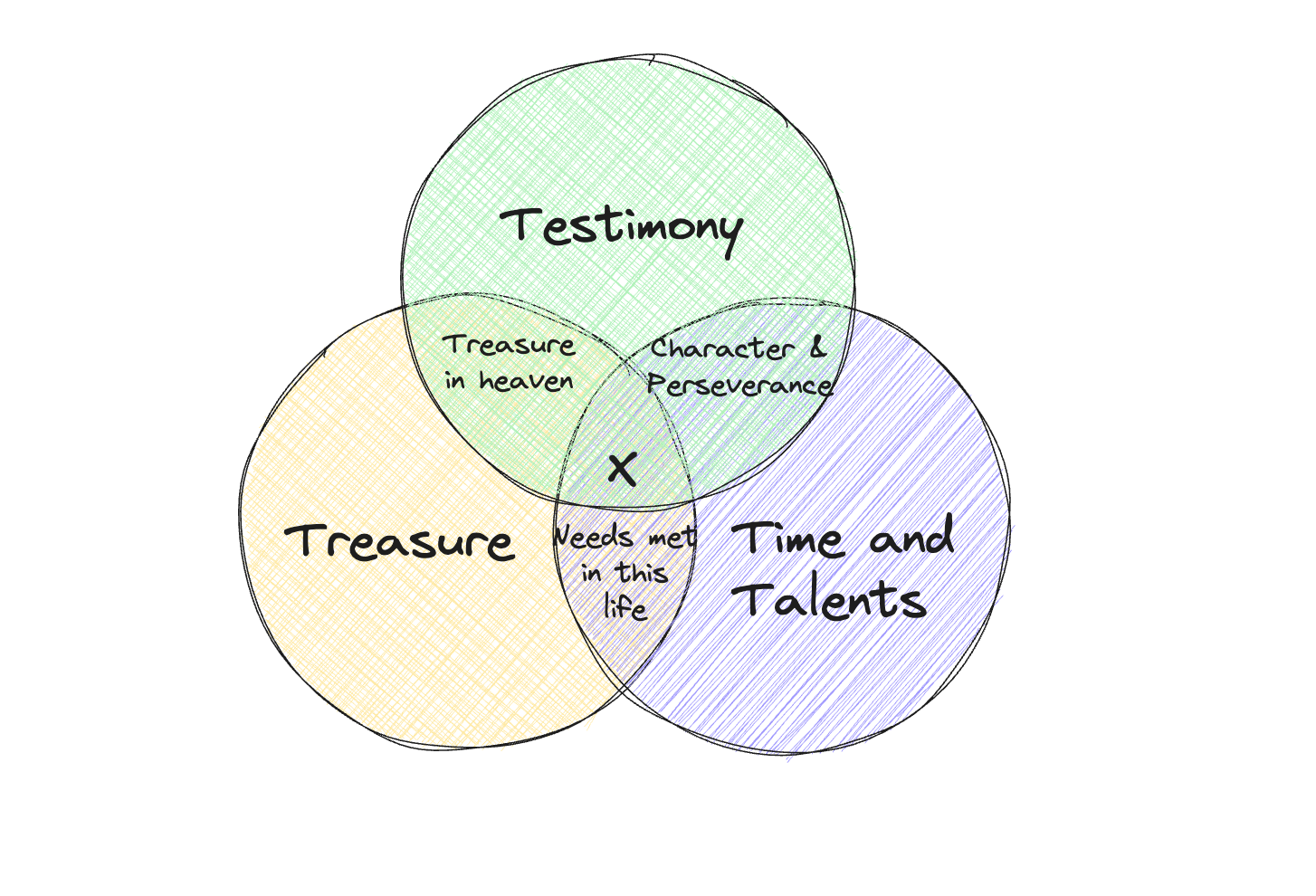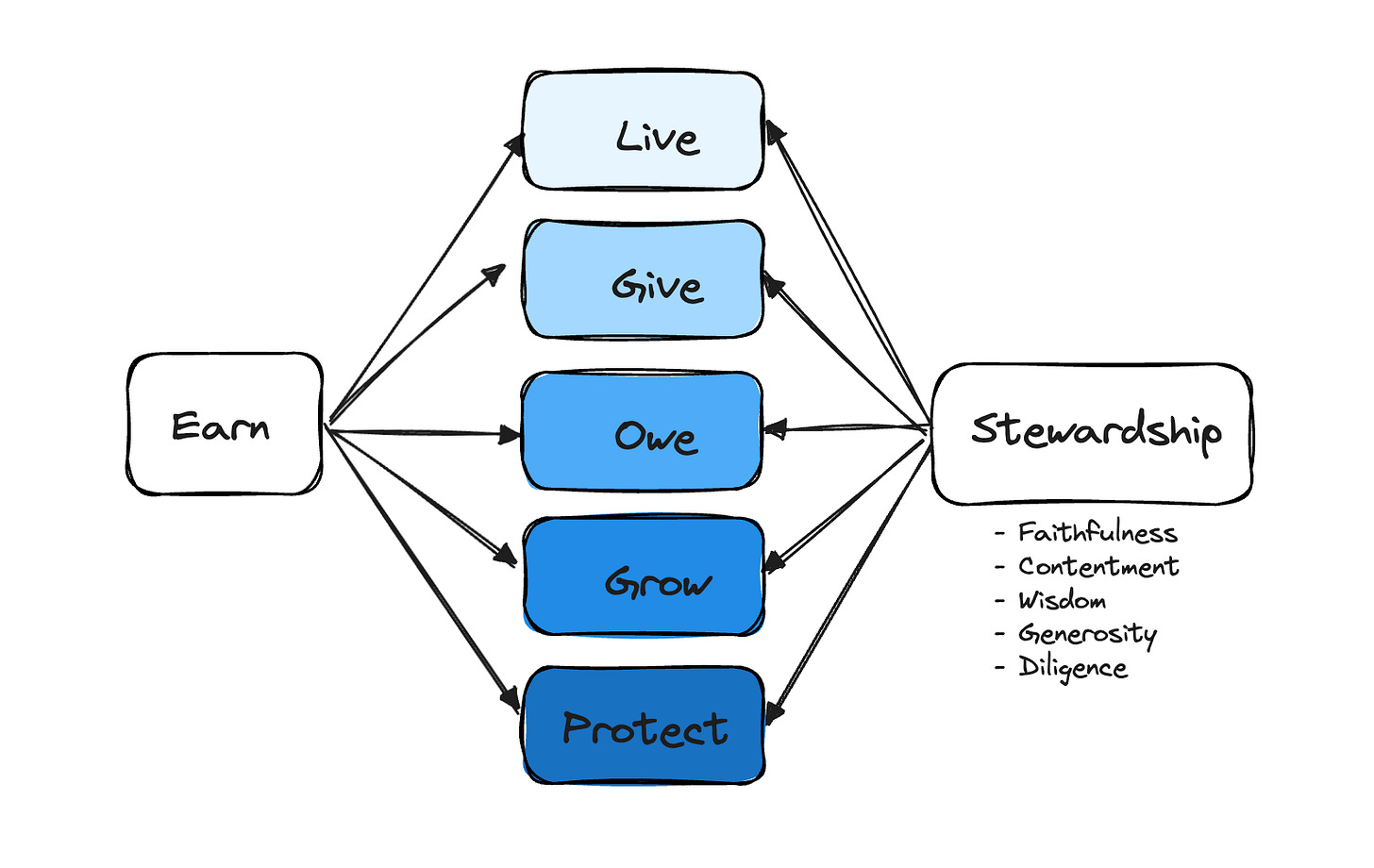In a nutshell, it means that because God owns it all, and all you have is God-given. Stewarding is managing what God entrusts to you in ways that honor, obey, and glorify Him.
If God owns it but gives things to you to manage, it’s reasonable to assume that he cares a lot about what you do with what he entrusts to you. That’s the responsibility of stewardship he places on us. I realize that “stewardship” sounds a little stodgy, and when you hear it in the introduction to a Sunday sermon, your first thought is, "Oh boy, here comes the annual "money talk" about giving. Zzzzzzzzz. . . .
(It's like that friend from college you haven't heard from in a few years, who just got a job selling life insurance, who calls you out of the blue and asks you to have lunch so they can "catch up and maybe talk a little bit about your financial future"—you know where this is going).
In today's culture, stewardship is hard to comprehend because of our "what's mine is mine" attitude. But we could put it more simply by saying that it means taking responsibility for something that doesn't really belong to us—in this case, all of God's gifts and resources: our time, talent, treasure, and testimony (which is our gospel witness to others based on our character, influence, relationships, etc.)—see Psalm 24:1.
We're mainly focused on our "treasure"—not buried treasure, unless your savings are buried in a coffee can in your backyard (do they even make coffee cans anymore?). No, we're talking about mullah, cheddar, dough, bucks, cash—that type of thing.
But stewardship and its components of faithfulness, contentment, wisdom, generosity, and diligence guide our decisions and practices in each of the ways we can use our money (spend, save, borrow, grow, and give):
Faithfulness: We hold our finances loosely, trusting God to guide our decisions;
Contentment: We rest in God’s provision for us, even when we face financial challenges;
Wisdom: Because God owns it all, every decision is a spiritual decision, and God wants to guide us in what we do;
Generosity: Because we hold them loosely and are grateful to God for all his good gifts, we freely give to God and others as God has freely given to us;
Diligence: Because we have been entrusted with many gifts, we devote the time and effort to manage them well.
This all sounds very theological and abstract, so what does biblical stewardship look like in practice?
Stewardship is life. It frees us to live a life of love and gratitude. Stewardship isn't just a financial concern; it's a way of life for Christians. It’s not just something we do (e.g., giving); it’s how we live (i.e., with generous hearts).
A stewardship lifestyle requires a change in attitude toward accumulating and disposing of assets. We do have some freedom here, but we’re not free to do whatever we want, whenever we want, with all that we have; the highest purpose of our resources is to use them to serve God’s kingdom (1 Peter 4:10-11).
Embracing a lifestyle of stewardship means living a life characterized by gratitude and a desire to use God’s gifts for his glory. We’re grateful because we recognize that God bestows these things upon us because of His grace and benevolence, not because we ‘deserve’ any of them.
God is glorified whenever we use what he has provided following biblical principles. That means we use our financial resources to provide for ourselves (and our families when we have one), enjoy God’s good gifts, which include nature and material things (in moderation, of course), and primarily when we use them to bless others through generosity.
Stewardship frees us from the love of money. As disciples of Jesus Christ, we want to be good stewards, so we commit ourselves, our money, and our possessions to God (Luke 14:33).
But we don’t renounce money and start bartering or buying things with wampum (it was a thing; you can google it) or put all our money into gold bullion or a coffee can in the backyard.
No, we renounce the LOVE of money, the WORSHIP of money. We may do this at conversion as part of our repentance, but it’s not just a “one-and-done” thing. We have to do it every day.
In Matthew 6:24, Jesus tells us we cannot serve God and money. We have to make an either/or choice. In Christian liberty, we use money for our good, but we avoid the idolatry of money by also using it for kingdom work and the service, care, and welfare of others.
Stewardship frees us from “money guilt.” God wants us to enjoy His gift of money. Yes, you read that right. Stewardship helps us to experience “Godly enjoyment” because we recognize that it’s all God’s and prayerfully manage the funds entrusted to us to the best of our ability. When we keep our hearts tuned to God (this is the key), we can spend our money guilt-free and enjoy the fruit of our labor.
Everything that God provides us is also for our enjoyment. Consider 1 Timothy 6:17 (Chapter 6 is fantastic about giving), where Paul said that God “richly provides us with everything to enjoy.”
Yes, we must pay attention to the first part of the verse—we should not set our hope on riches, but we can also focus on the last part: enjoying God’s good gifts. God wants us to enjoy the spending, the giving, and the saving because he “richly provides us with everything for our enjoyment.” That’s also part of good stewardship.
Now you’re ready to run out and have fun with your money, right!? Okay, but before you do, there is more to learn; there are wise and unwise ways to do that.
For reflection: Have you really considered what it means to be a “steward”? What do you need to change in your current financial habits to better align with stewardship principles? Pray and ask God for His help.
Verse: “As each has received a gift, use it to serve one another, as good stewards of God's varied grace; whoever speaks, as one who speaks oracles of God; whoever serves, as one who serves by the strength that God supplies—in order that in everything God may be glorified through Jesus Christ. To him belong glory and dominion forever and ever. Amen” (1 Peter 4:10-11, ESV).






